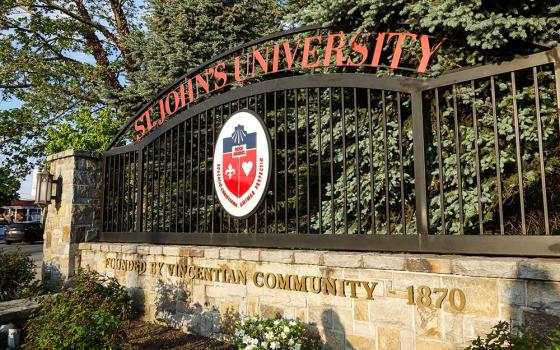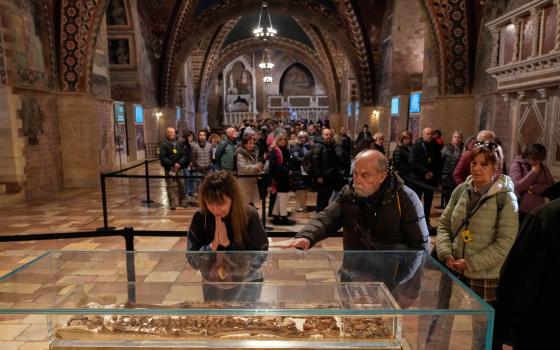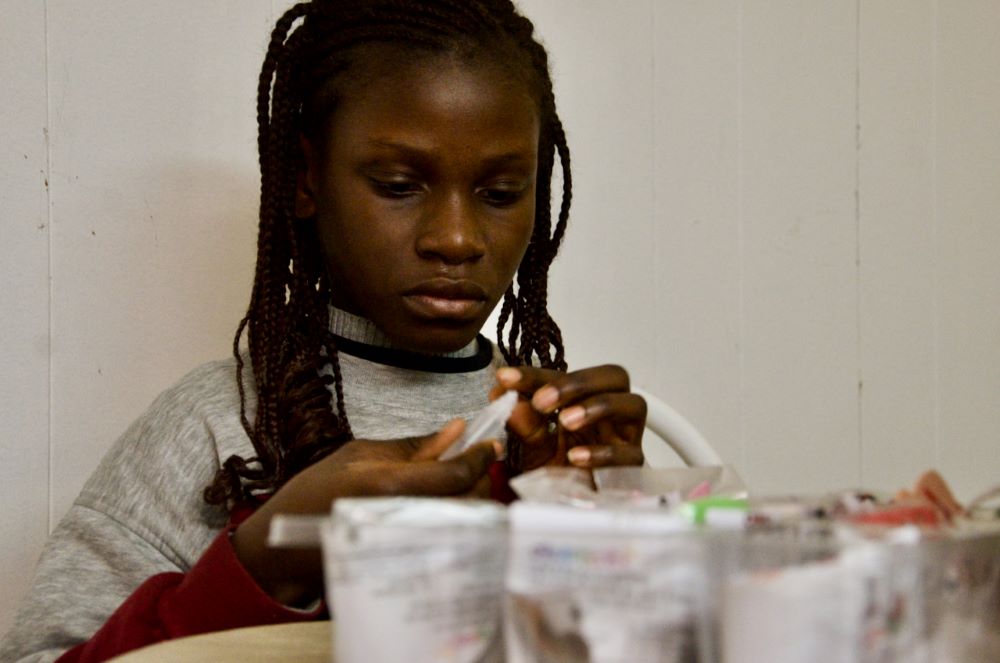
Aminata makes tiny ornaments for a construction paper Christmas tree Dec. 13, 2023, in the apartment she and her sister share in Chicago. (GSR photo/Dan Stockman)
In those days a decree went out from Caesar Augustus that the whole world should be enrolled. … So all went to be enrolled, each to his own town (Luke 2:1-20).
For Elizabeth, this does not feel like her home. At least not yet. But she is so grateful to be here, in a warm apartment instead of on the streets, or worse.
Her family's journey from Venezuela — much more arduous and dangerous than walking the 70 miles from Nazareth to Bethlehem — began more than a year ago. In fact, by Christmas 2022, they were so close to their destination of the United States that they could see it from across the Mexican border. But they still couldn't get there, because the controversial Title 42 policy remained, forcing asylum seekers to wait outside the United States for their claims to be processed.
And Christmas that year was awful: They missed the family they had left behind, they were living outside in tents and the children were all sick from the cold and depleted immune systems from walking much of the 3,000 miles.
Finally, Doctors Without Borders volunteers treated the children and got the family into a hotel. In January, they crossed into Texas and asked for asylum and were flown to New York where Elizabeth’s niece, Rosa (Global Sisters Report is using only first names in this report as their asylum cases are pending), developed a fever and had to be hospitalized.
Then they were flown to Chicago, where they lived in a shelter until Aug. 1, when everything changed.
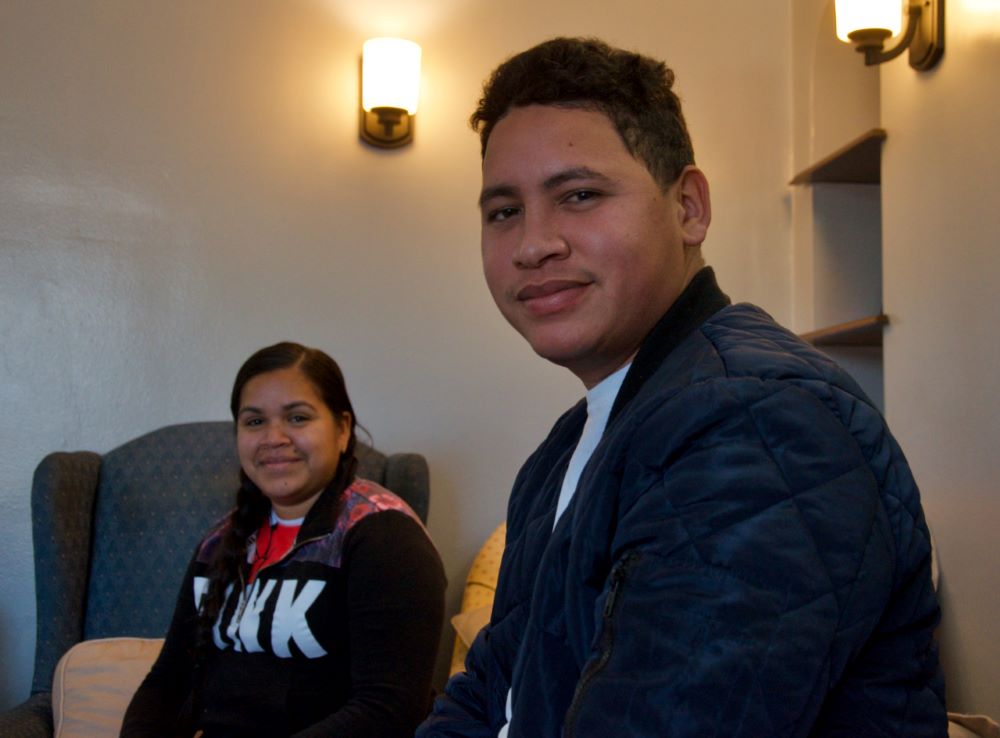
Elizabeth and Angelo relax in an apartment in Chicago Dec. 13. The couple and several family members, all from Venezuela, are awaiting the outcome of their asylum applications. (GSR photo/Dan Stockman)
And suddenly there was a multitude of the heavenly host with the angel, praising God and saying: "Glory to God in the highest and on earth peace to those on whom his favor rests.” (Luke 2: 13-14).
Mercy Srs. JoAnn Persch and Pat Murphy will be the first to tell you they're not angels. But they, along with Mercy Associate Carol Conway and dozens of volunteers and donors, have been hard at work delivering peace and mercy to asylum seekers, including Elizabeth and her family members, who on Aug. 1 moved into the apartment the sisters' organization sponsors.
They began the Interfaith Committee for Detained Immigrants in 2014, but by 2022 had largely moved on to other work. Then the buses started arriving.
In August of that year, Texas Gov. Greg Abbott began sending busloads of asylum seekers to cities that had declared themselves sanctuaries for migrants — Abbott's office says it has bused more than 50,000 people north, including more than 18,500 to New York, more than 12,500 to Washington, D.C., and more than 13,500 to Chicago.
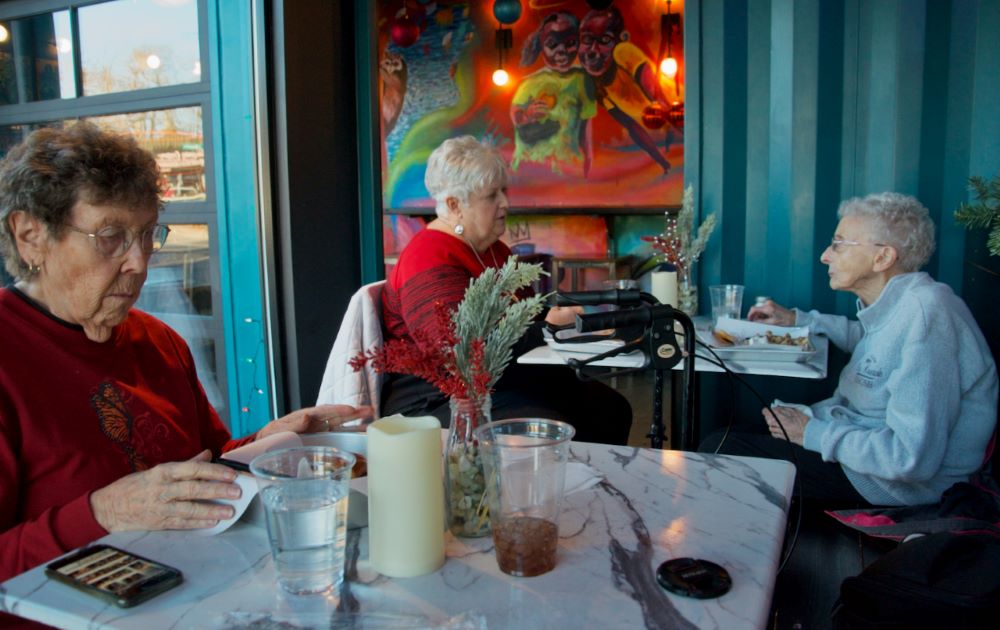
From left: Mercy Sr. JoAnn Persch, Mercy Associate Carol Conway and Mercy Sr. Pat Murphy enjoy lunch Dec. 13 between stops visiting migrant families they sponsor in Chicago. (GSR photo/Dan Stockman)
City of Chicago officials say more than 25,000 migrants have arrived on buses from Texas, and another 4,000 have arrived by plane, overwhelming the city's shelters and relief efforts. The Associated Press reports New York has received more than 120,000 asylum seekers. There is no room at the inn, at the shelter, or anywhere else. As of Dec. 1, as Chicago began a major push to get migrants into shelters, more than 1,000 were living in police stations or in tents on the sidewalks outside police stations, bracing for Chicago's notoriously brutal winter.
By Dec. 14, Chicago officials said the number was down to 111 in police stations and another 228 at O'Hare Airport.
Persch and Murphy knew they had to do something, and Conway suggested sponsoring a family. Mercy associates and sisters pledged monthly contributions to pay the rent, and by October 2022, a mother from Sierra Leone and her five children were warm, safe and dry in an apartment.
'It's just overwhelming. But we're doing something. It's not even a drop, but it's something. It makes it easier to sleep at night.'
—Mercy Associate Carol Conway
Conway said sponsoring a family sounded easy.
"One family, oh we can do this," Conway recalled. "But it requires not just getting an apartment, but furnishing it, getting the kids in school, getting them immigration attorneys. [Persch and Murphy] knew what was involved, but I didn't know."
On entering the house they saw the child with Mary his mother. They prostrated themselves and did him homage. Then they opened their treasures and offered him gifts of gold, frankincense, and myrrh (Matthew 2:11).
Soon they had a bank account and incorporated as a not-for-profit organization, Catherine's Caring Cause, named for Mercy foundress Catherine McAuley. There were bumps along the way, but as Persch says, "We don't take no for an answer." They also have friends in high places, such as U.S. Sen. Dick Durbin, who attended Murphy's 90th birthday party.
And they know doctors and lawyers and individuals who can make $10,000 donations.
"God is very good to us, that's the truth," Persch said. "And from our past, we know a lot of people."
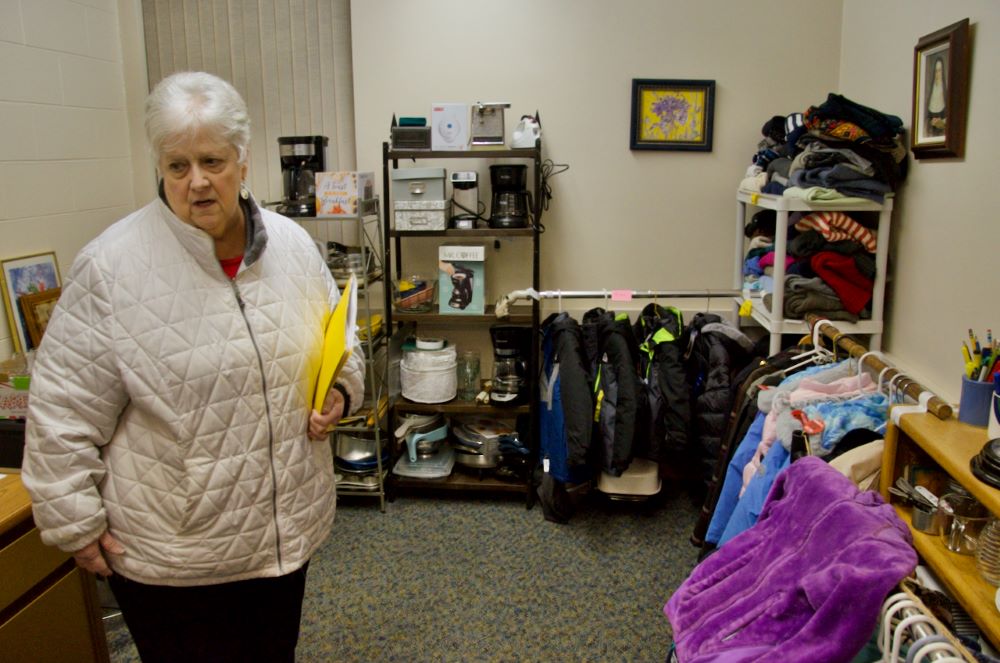
Mercy Associate Carol Conway shows one of the rooms filled with donations where asylum seekers can get furniture, clothing, small appliances and household items for their apartments. (GSR photo/Dan Stockman)
Persch, 89, and Murphy, 94, have been helping migrants since the 1980s, when they began ministering to people fleeing oppression and terror in Central America. The need never seemed to stop, and neither did they. They are such a force of nature that their tireless volunteers and generous supporters almost seem to be just along for the ride.
"Of course, when you have one family, you're going to have two," Persch said. As of Dec. 13, they were sponsoring housing for 12 adults and 17 children, but that, too, was about to change: "Oh, I forgot to tell you," Persch told Murphy and Conway, "there's a couple and their three children staying in a hotel where they have to sell candy on the street and then turn in the money. We're taking them."
Conway said despite the political controversy over the influx of migrants — some suburbs have vowed to turn away asylum seekers — people want to help but often don't know how.
"It's just overwhelming," Conway said. "But we're doing something. It's not even a drop, but it's something. It makes it easier to sleep at night."
The angel of the Lord appeared to Joseph in a dream and said, "Rise, take the child and his mother, flee to Egypt, and stay there until I tell you. Herod is going to search for the child to destroy him" (Matthew 2:13).
Isatu and her little sister Aminata are Muslim and don't celebrate Christmas. But the holiday is difficult to escape in Chicago, so on a golden December afternoon, Aminata is at the kitchen table making tiny paper ornaments for a construction paper Christmas tree. A Quran sits nearby.
They arrived in the United States from Sierra Leone May 12, and have been in their Catherine's Caring Cause provided apartment since Oct. 1 after a stay in Ohio and a shelter in Chicago's Englewood neighborhood.
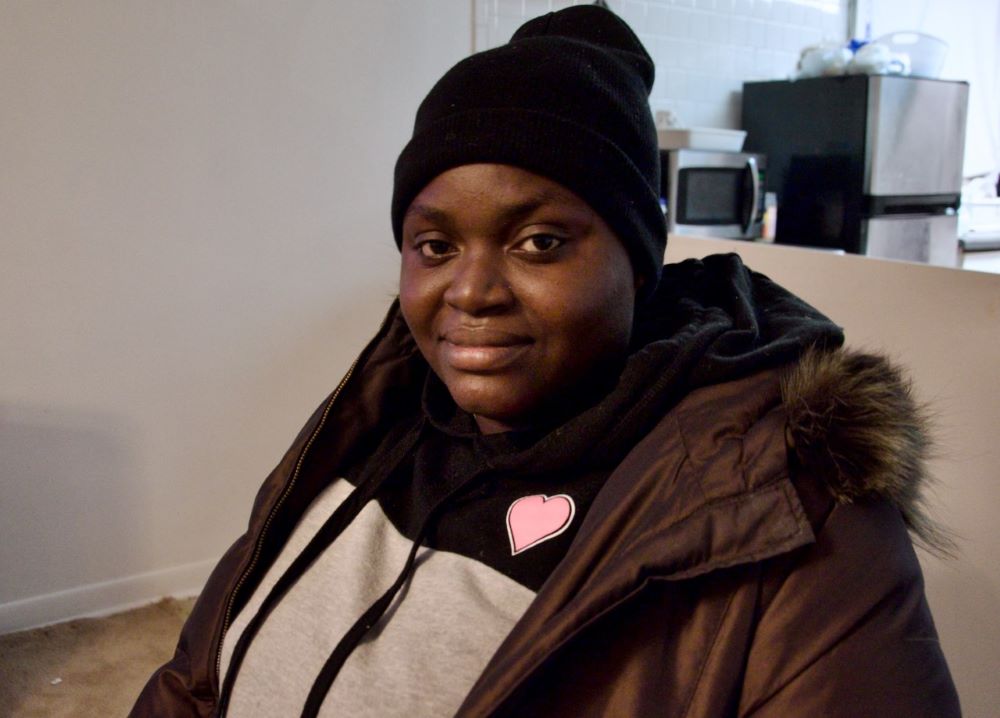
Isatu and her little sister Aminata fled Sierra Leone, where they faced female genital mutilation. They now are living in an apartment in Chicago, seen here on Dec. 13. (GSR photo/Dan Stockman)
Like the Holy Family, Isatu, 22, and Aminata, 10, were fleeing a terror directed at them: The Bundu society they lived in requires female genital mutilation.
What was it like living under that threat?
"I was thinking I'm going to lose my life or not (be able to) have a child," Isatu said.
So Isatu left everything behind and fled Sierra Leone with Aminata, giving up family, friends and everything she knew. But she and her little sister are now safe, and fifth-grader Aminata can instead think about the book she's reading, Diary of a Wimpy Kid.
"It was worth it," Isatu said.
It's hard to think about the future when you have to worry about asylum applications and immigration law and how to make a living when you're not legally able to work, but Isatu knows what she wants to do when they are truly settled.
"I want to study medicine and help the girls back home," she said.
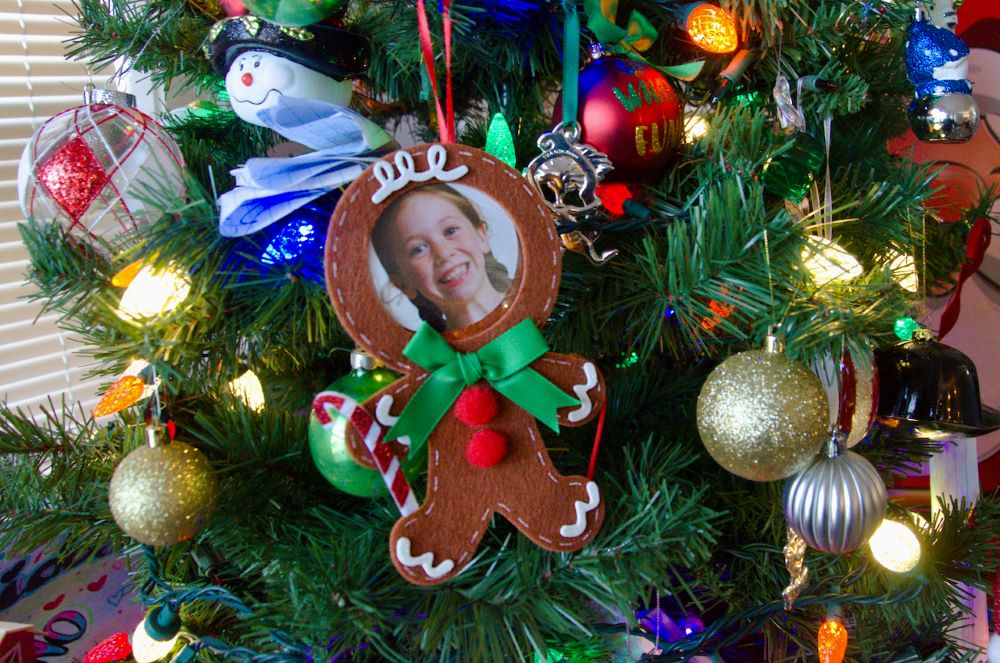
The ornaments on Elizabeth and Angelo's Christmas tree were donated, so some still have the stock photos that came in them when they were purchased. (GSR photo/Dan Stockman)
Joseph rose and took the child and his mother by night and departed for Egypt. He stayed there until the death of Herod (Matthew 2:15).
The journey from Bethlehem to Egypt is more than 400 miles, and the terrain is unforgiving.
The Darién Gap is only a 60-mile path on the border of Colombia and Panama, but it is a stretch of impenetrable jungle and 3,000-foot mountains, cut by rivers that can suddenly become raging torrents. There are no roads — it is the only gap in the Pan-American Highway — no bridges, no cell service, no food and no clean water. The heat and humidity are unrelenting.
There are no doctors if you are injured, which is a real possibility in the muddy, mountainous landscape, or to treat you when you become sick from drinking out of a contaminated stream. But there are armed gangs and criminals, who rob, rape and kill migrants who make the crossing. Hundreds have died in the attempt.
Even if you make it to civilization, conditions are bleak: Bajo Chiquito, Panama, the first settlement migrants encounter after leaving the jungle, is a tiny village. Humanitarian agencies have set up relief efforts there, but resources such as bathrooms and clean water are limited. Officials estimated up to 500,000 people made the trek this year, overwhelming services at both ends of the trail.
Advertisement
It took Elizabeth and her family three days to get through, but it can take 10 days or more.
"It was terrible," Elizabeth said.
But they made it, and even though their apartment is not their own, their furniture donated, as is much of their food — one of the Christmas ornaments on their tree still has the stock photo that came in it from the store — they are safe and warm. Elizabeth and her husband Angelo are both working and know that they will have opportunities that do not exist in Venezuela: The inflation rate there — the worst in the world — was more than 400% in 2017, more than 45,000% in 2018 and 146,000% in 2019.
"We're very happy, secure and grateful," Elizabeth said, with Murphy translating. "We're grateful we're finally here to celebrate Christmas. … Here is much better."




